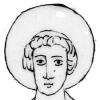پستها: 18
زبان: English
delsydebothom (نمایش مشخصات) 5 دسامبر 2015، 18:49:43
I am a (very) new beginner--I've been studying Esperanto for all of two weeks. One of the ways I've been hoisting myself into sure-tongued confidence in the language is by making translations of some of the grammatically simpler Gregorian Chants, and then singing them. Here, one word which appears again and again, in its various permutations, is "Dominus". For this, "sinjoro" suggests itself, being (I take it) the standard word for "Lord". Like most words in both Esperanto and Latin, it sort of "floats" on the vowels in an innately musical way.
It is a lovely word--tuneful and apt. Yet, "Dominus" suggests something more. Moreover, Esperanto already has the verb "domini", pointing (so I fancy) to the existence of its parent word "hidden" within the language. It occurred to my mind, then, that "Domestro" might not be too intrusive a formation, as least for my own use. Still, it isn't something I'd want to get used to saying should it seem awkward to those on whom I'd otherwise be wont to inflict it. So, I put my questions: (1) Does the word make sense? (2) Is this sort of neologism welcome?
delsydebothom (نمایش مشخصات) 5 دسامبر 2015، 18:58:24
bartlett22183 (نمایش مشخصات) 5 دسامبر 2015، 19:15:54
delsydebothom (نمایش مشخصات) 5 دسامبر 2015، 19:22:21
bartlett22183:Please be aware that the "Questions" forum is exclusively for texts in Esperanto itself, i.e., questions themselves written in Esperanto about E-o issues. I am not the administrator, but it would seem to me that your question, for a beginner, is legitimate in the English forum, as it pertains directly to E-o, if you think you are not yet competent to ask in E-o.Many thanks! That makes good sense.
gregorynacu (نمایش مشخصات) 5 دسامبر 2015، 19:35:14
Domestro ne signifas dominus al mi. Domestro estas la estro de la domo. Do, eble nur tre poezie.
Well, I think "lordo" is a word too.
Domestro doesn't mean the same as dominus in my opinion. Domestro is just the head of the house. It could be used but it would have to be being used poetically.
delsydebothom (نمایش مشخصات) 5 دسامبر 2015، 22:35:07
gregorynacu:Nu laŭ mi, Lordo ankaŭ estas vorto.Much obliged!
Domestro ne signifas dominus al mi. Domestro estas la estro de la domo. Do, eble nur tre poezie.
Well, I think "lordo" is a word too.
Domestro doesn't mean the same as dominus in my opinion. Domestro is just the head of the house. It could be used but it would have to be being used poetically.
That brings up an interesting point. "Dominus" itself is built up of "domus" (meaning "house" ) and "-inus" , meaning "owner". This is a pattern not at all uncommon for ye olde Lordly words. Consider the Greek title "kurios" , which in antiquity belonged to those who held the deed to a house. The Amharic, too, has "bal" , which means "owner", "lord", "husband", with a few other related meanings shared with cognates in Semitic tongues.
"Lord" also has a history rather brown and homely. It started as "hlāfweard", which is to say, "loaf-ward". The majesty of such a title ("Guardian of the Loaf" ) increases in proportion to the esteem one gives to bread.
erinja (نمایش مشخصات) 5 دسامبر 2015، 23:50:12
The first line of Psalm 109 or 110 reads "dixit Dominus domino meo", "The LORD said to my lord", and it is a good illustration of what I'm about to say. The repeated word domin[us/o] makes you think that the original Hebrew repeats a word, but it doesn't. The first "Dominus" represents the four letter name, and "domino" refers to a person, a small-L lord.
In Hebrew, we do not pronounce the name, so when we see the four-letter name, we read it as if it says "adonai" (lord, which can also mean an earthly lord). Latin picks up on this in the translation, as does English, with capitalization normally the only distinguishing mark to tell us whether the original Hebrew had the tetragrammaton ( "LORD" or "Lord" ) or the actual word "lord" for an earthly person.
Getting back to Esperanto, "Sinjoro" came into use because it is generally the custom in Romance languages to use this name to refer to the deity (El Señor, Il Signore, etc), and Esperanto picks up on this because Romance languages are frequently a model for vocabulary choices. We have the same confusing issue here, "La Sinjoro diris al mia sinjoro", same repeated word for two different Hebrew words.
Hope is not lost for you, fortunately, because "Sinjoro" is not the one and only choice, even if we stick with the custom of using Romance languages as a model for Esperanto vocabulary choices. Zamenhof's translation of the Hebrew Bible generally (always? I haven't read the whole thing) uses "Eternulo" to refer to the 4-letter name, and this is also a common Romance usage. The "Dixit dominus domino meo" is therefore rendered by Zamenhof as "La Eternulo diris al mia sinjoro". There is no earthly "Eternulo", so it is clear who we are talking about, you have nice vowels, and "sinjoro" can mostly be saved for the earthly kind of lord.
delsydebothom (نمایش مشخصات) 6 دسامبر 2015، 0:11:22
erinja:I think people would think it exceedingly strange if you said "Domestro" in this context, but of course if you're doing something privately in your home, no one would really know! But keep reading, I have another solution for you.Thank you! I believe I recall a French translation also using "l'Eternel" for the divine name. Of course, the real thing still gets sneaked in all over the place as a component of human names (I'm looking at you, Joshua). Then there are little lexical islands like "Hallelujah" which falls short of sticking out like a sore thumb only because the old LXX plopped it down pageward, untranslated. Though, when I look at the wild circus of words connected to "hilél", I think I understand why--not that I can't appreciate the link between "shiny" and "insane".
The first line of Psalm 109 or 110 reads "dixit Dominus domino meo", "The LORD said to my lord", and it is a good illustration of what I'm about to say. The repeated word domin[us/o] makes you think that the original Hebrew repeats a word, but it doesn't. The first "Dominus" represents the four letter name, and "domino" refers to a person, a small-L lord.
In Hebrew, we do not pronounce the name, so when we see the four-letter name, we read it as if it says "adonai" (lord, which can also mean an earthly lord). Latin picks up on this in the translation, as does English, with capitalization normally the only distinguishing mark to tell us whether the original Hebrew had the tetragrammaton ( "LORD" or "Lord" ) or the actual word "lord" for an earthly person.
Getting back to Esperanto, "Sinjoro" came into use because it is generally the custom in Romance languages to use this name to refer to the deity (El Señor, Il Signore, etc), and Esperanto picks up on this because Romance languages are frequently a model for vocabulary choices. We have the same confusing issue here, "La Sinjoro diris al mia sinjoro", same repeated word for two different Hebrew words.
Hope is not lost for you, fortunately, because "Sinjoro" is not the one and only choice, even if we stick with the custom of using Romance languages as a model for Esperanto vocabulary choices. Zamenhof's translation of the Hebrew Bible generally (always? I haven't read the whole thing) uses "Eternulo" to refer to the 4-letter name, and this is also a common Romance usage. The "Dixit dominus domino meo" is therefore rendered by Zamenhof as "La Eternulo diris al mia sinjoro". There is no earthly "Eternulo", so it is clear who we are talking about, you have nice vowels, and "sinjoro" can mostly be saved for the earthly kind of lord.
erinja (نمایش مشخصات) 6 دسامبر 2015، 0:59:47
Words like "hallelujah" (in Hebrew) are not normally treated as being super problematic for containing the name, but some people who are being extra religious and careful do treat this word as a name, and take the necessary precautions with the paper it's on.
delsydebothom (نمایش مشخصات) 6 دسامبر 2015، 3:07:39
erinja:Yes, the two halves of the tetragrammaton end up in a lot of names, as does "el", especially in the form "eli" (a 1st person possessive form). As part of a name it isn't problematic to write it, but we don't generally write either half of the tetragrammaton as a stand-alone word, and when it comes up in the Hebrew numbering system (as the numbers 15 and 16), something else is substituted instead, so not to be writing it in ordinary usage (it's done as 9+6 and 9+7 instead of the ordinary 10+5 and 10+6)I know this has veered off-topic, but I've wondered for a while what relationship the electronic representation of the Torah and related texts has had on pious customs of that kind. Given that the entire image on screen is redrawn sixty or so times per second, a computer monitor must seem like a spastic electro-shredder of blasphemic doom, the likes of which would lead poor Jeremiah to drown in his own lacrimosious excretions.
Words like "hallelujah" (in Hebrew) are not normally treated as being super problematic for containing the name, but some people who are being extra religious and careful do treat this word as a name, and take the necessary precautions with the paper it's on.




